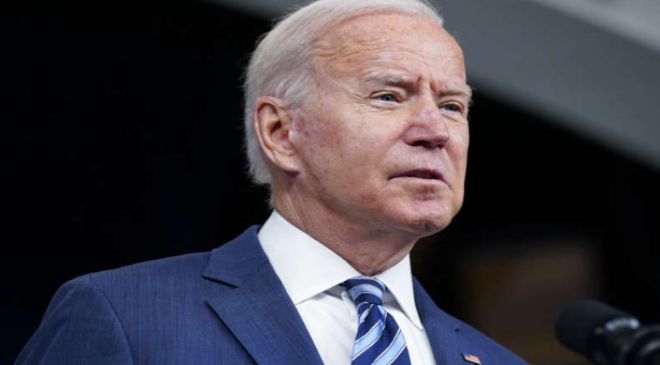CARLSBAD, Calif. — President Biden on Thursday made his second trip to California in less than three weeks in the hopes of boosting Democratic House members whose reelection chances are sinking amid soaring gasoline and grocery prices, rising homelessness, and a spike in violent crime.
Biden’s visit just days before Election Day is focused on bolstering two-term Rep. Mike Levin, who is facing a formidable challenge from Republican businessman Brian Maryott. It’s a rematch for control of California’s 49th Congressional District, a mostly affluent coastal area located in north San Diego County with parts of Orange County, whose redrawn district map tilts slightly Democratic.
Levin flipped the district to Democratic Party control in 2018 and bested Maryott by 6 points in 2020. Last week, however, the political ground in Southern California shifted, giving several GOP campaigns, including Maryott’s, a new jolt of energy.
Top political analysts moved the race for control of the 49th District to a “toss-up” from its previous “leans Democratic” status. On Tuesday, Levin was among the candidates the Democratic Congressional Campaign Committee identified as requiring “immediate resources” to win their seats.
As part of a four-state, three-day campaign swing that began in New Mexico, Biden delivered a 50-minute address to a crowd of roughly 1,000, packed into a gymnasium at Mira Costa Community College in Oceanside, a heavily Latino, working-class area of the mainly affluent coastal district.
“This guy delivers,” Biden told the crowd. “And he’s fighting to protect democracy.”
But far from Biden throwing a life vest to Levin, district voters across the political spectrum told RealClearPolitics the commander in chief’s visit will either have no impact on their voting decisions or make them more compelled to vote Republican.
“I don’t really get behind the whole traveling roadshow thing with politicians, because the reality is, their being here or being in Washington or another state … we already know what their political beliefs are. We already see the work that they haven’t done,” Bob Bulduc told RCP Thursday outside a Shell gas station a few miles from where Biden was scheduled to speak. “The election is Tuesday. What possible impact could they have on a material number of votes? I think it’s minimal.”
Bulduc, 52, describes himself as an independent who is voting mainly Republican this year.
“The economy is out of control, and [Democrats] are talking about climate change, which is kind of funny because we won’t pump oil here, but we’ll beg other countries to pump oil for us,” he said, adding that he thinks Biden’s foreign policy has emboldened China, Russia, and Iran.
Alex Demos, 65, a registered independent, says he has recently tended to vote Republican after nearly 45 years as a Democrat. This year, he’s voting for Maryott and said Biden’s visit to the district makes him even more motivated to turn in his ballot.
“My feelings toward Joe Biden haven’t really changed over the last 40 years, to be honest with you,” he said. “I considered him a lot of talk and no action, and now I don’t even understand what he’s talking about half the time. Does it make me more likely to vote? Yeah, but not for the Democrats.”
The women RCP approached declined to speak on the record with their names attached. One described herself as a Democrat who planned to vote straight party-line on her ballot, something Biden’s visit wouldn’t impact.
“I’m just hoping for the best at this point,” she said.
Such fatalistic sentiments have Democrats deeply worried about their prospects in purple areas of the state. In 2018, Republicans lost seven California House seats in a thumping so severe that then-Speaker Paul Ryan questioned the state’s “bizarre” voting system that appeared to hand several Republicans victories on election night and then snatched the victories in the next week when all the mail-in votes were counted.
Republicans managed to win back four of those seats in 2020, in part with targeted get-out-the-vote efforts specifically designed to increase Asian American turnout in key districts. Two of the four winning candidates, Reps. Michelle Steel and Young Kim, are of Asian descent and represent different parts of Orange County.
This cycle’s targeted turnout efforts started in the summer when the Republican National Committee launched its first voter outreach center of the cycle and its first Asian Pacific American Community Center. The center is in Orange County’s “Little Saigon” in Westminster, home to the world’s largest concentration of Vietnamese people outside of Vietnam.
This year, the Cook Political Report included 11 California seats as among the most competitive races in the country. Of those 11, four are currently designated as “lean Republican” or “likely Republican,” including the seats held by Steel and Kim.
Unlike the last two election cycles, when pro-Levin direct mail and digital messages dominated the district, Maryott and the California Republican Party have sent a flurry of their own over the last few weeks. Republicans have managed to nearly match Democrats in advertising spending here. In the eight most competitive races across the state, Democrats have only narrowly outspent Republicans on television ads, $52 million to the GOP’s $51 million, according to advertising tracking firm AdImpact.
Even though Democratic voters outnumber Republicans 2-1 across the state, Republican party officials believe deep anger over inflation and the economy has energized their base and will prompt more independents and even some Democrats to break their way.
“Momentum is definitely on Republicans’ side going into Election Day,” California GOP Chairwoman Jessica Millan Patterson told RCP. “Voters are fed up with Democrats and are smartly blaming them for rising prices, surging crime, failing schools, and rampant homelessness.”
Over the weekend, Gov. Gavin Newsom was asked if it feels like a red wave is coming and conceded, “Yeah, of course it does.”
“Look, I can be the cheerleader” for Democrats, but “I’m also pragmatic … you feel it,” he told CBS news on Saturday. “It’s not just intellectualization based on polling.”
One of the California districts now considered a toss-up is the neighboring 47th District. Once a dependably Republican seat in Orange County, Rep. Katie Porter flipped it to the Democrats in 2018 and won her 2020 reelection by 7 percentage points.
Last month, Biden traveled there to boost support for Porter, who has become a party luminary, prolific fundraiser, and unapologetic progressive.
On Thursday, Porter’s opponent, former assemblyman Scott Baugh, called the Biden visit “a cry for help by the Democrats” and said the contest has been close since at least August when the Labor Department released the consumer price index showing inflation on everyday goods rose more than expected.
“They know they’re having a hard time turning out their base. Well, if their base is suppressed, it’s because of the policies of Katie Porter and Joe Biden,” he told RCP. “Having Biden come out to stir them up seems counterproductive.”
When Biden made an appearance on behalf of Porter at an Irvine community college two weeks ago, only 40 to 50 people showed up to hear him speak. Since then, the landscape has continued to shift in Republicans’ favor, polls show. Yet, Porter, who serves as deputy chair of the Congressional Progressive Caucus, is doubling down on efforts to appeal to and turn out her liberal base. Hollywood actress and Vietnam War activist Jane Fonda plans to join Katie Porter this weekend in knocking on doors and turning out Democratic voters.
On the stump and in media interviews, Porter echoes Biden’s talking points in blaming oil companies for high gas prices.
“I have no problem standing up to big corporations, especially when they’re cheating Americans. And right now, corporations are fueling inflation and overcharging families so they can earn record profits,” she told MSNBC on Wednesday. “Congress needs to hold them accountable.”
A strong supporter of abortion rights, Porter also prioritizes outreach to seniors, touting Democrats’ attempts to lower prescription drug prices and other healthcare costs, provisions included in the Inflation Reduction Act which Democrats passed in September.
The tougher-than-expected contest has forced her to devote $24 million to remain competitive in the race against Baugh, who has spent nearly $2.6 million as of late October.
Recently, the Baugh campaign has focused on outreach to the Iranian American community, which numbers in the tens of thousands in Orange County. When Biden visited Irvine in mid-October, more than 1,000 Persian American protesters stood outside the event voicing frustrations about relations between Washington and Tehran. The public outcry is taking place amid civil unrest in Iran over the death of Mahsa Amini, the 22-year-old who was arrested and killed by Iran’s “morality police” for violating the country’s hijab law.
Protesters outside of the Biden event demanded an end to nuclear negotiations between the Biden administration and the Iranian government, which Porter has backed.
Yet Baugh says the top issue in poll after poll remains the economy.
“[Voters] care about inflation,” he told RCP. “They care about the price of food. They care about their electricity bills, about the price of gas … what impacts their everyday lives.”
Baugh believes the momentum is on his side and said it’s palpable when he’s out knocking on doors. “Whether you call it a red wave or not, people are just interested in changing course and changing the direction of the country,” he said.
California Republican organizers said their voters are more energized this year in part because they have quality candidates vying for every major statewide office. Carl DeMaio, a San Diego political talk show host who heads Reform California, said his group and the California Republican Party worked to unite GOP primary voters behind one candidate to ensure that a competitive Republican advanced in the state’s “top-two” primary system.
“In this election cycle, we’ve focused on [candidate recruiting] and restocking the volunteer base,” he said. “We also engaged with Riverside, Orange County, and San Diego [GOP] central committees, and what we said was, ‘Look, we cannot split the vote.'”
DeMaio is enthused about GOP chances but cautioned that Democrats now have a 20-point lead over Republicans in early voting. On Thursday, he sent out an “urgent” plea to Republicans to send in or drop off their ballots.
DeMaio cited the latest breakdown of ballots returned statewide in California:
-Democrats: 50.6% (down 1.5% from this year’s primary).
-Republicans: 28.1% (up 2.3% from the primary).
-Independents: 21.3% (similar to the primary but a higher percentage among “conservative-leaning” independents).
“The situation is so serious that if we don’t spike these numbers to our target turnout in the next five days, we will likely fall short of winning many of our target seats and defeating 250+ tax hikes on the ballot,” he warned.







































